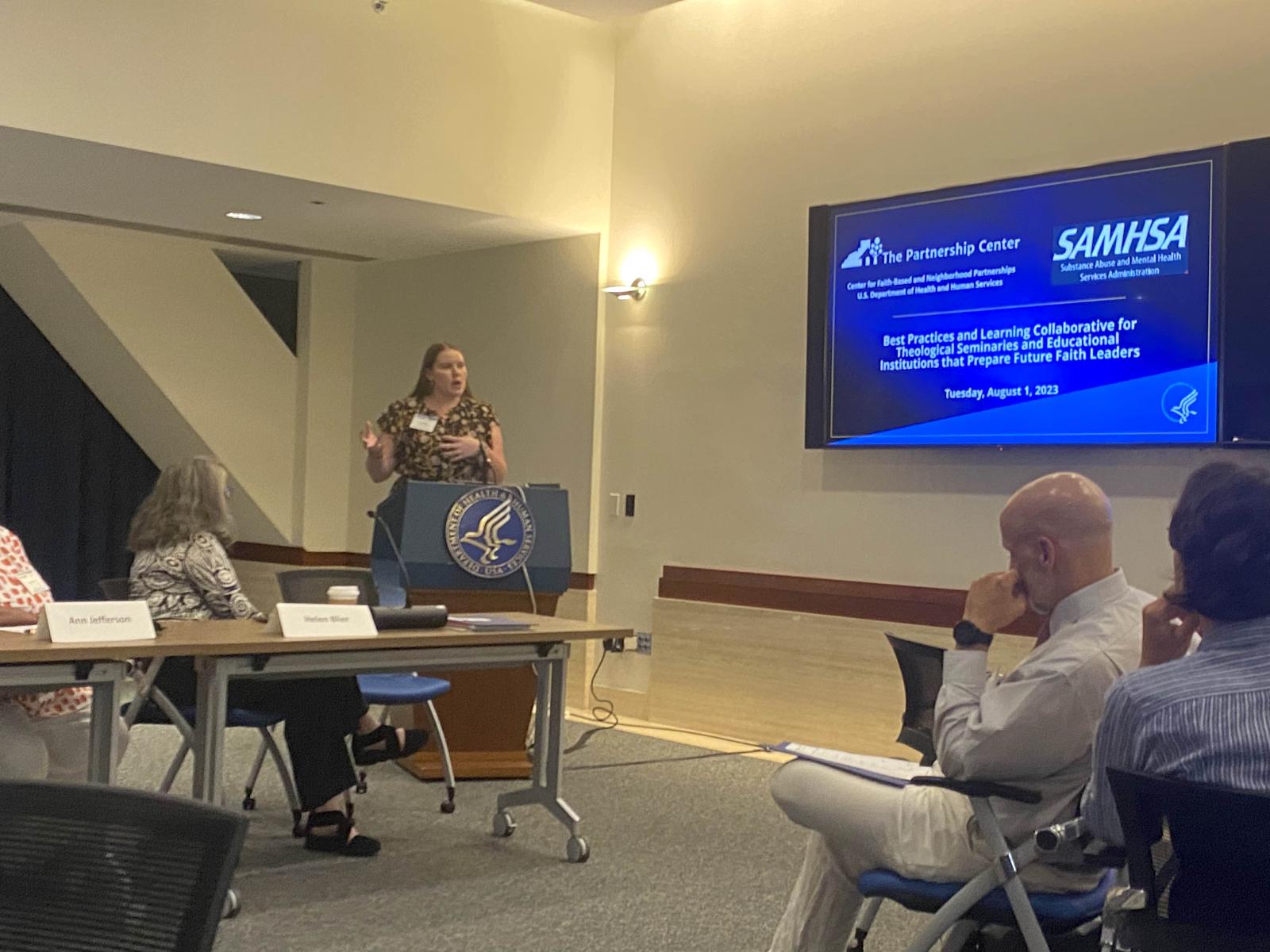C3I staff present findings at D.C. meeting hosted by SAMHSA & the US DHHS
As researchers and leaders in the field of trauma and congregations, staff from the Diana R. Garland School of Social Work’s Center for Church and Community Impact (C3I) were recently invited to present research findings at a meeting hosted by the U.S. Department of Health and Human Services Center for Faith-Based and Neighborhood Partnerships and the Substance Abuse and Mental Health Services Administration (SAMHSA).
The meeting, entitled “Best Practices and Learning Collaborative for Theological Seminaries and Educational Institutions that Prepare Future Faith Leaders,” focused on how institutions can address the mental health and well-being of future and current church leaders, incorporating mental health into seminary curriculum, factors that create challenges in serving faith leaders and collaborative efforts to address mental health among future and current faith leaders.
C3I Coordinator for Research Projects, Erin Albin Hill, attended the meeting and presented what was learned from the Center’s survey: “Trauma Sensitive Congregations”. SAMHSA was especially interested in this particular study which explored what church leaders are experiencing in ways of trauma education, resources, how prepared and competent they feel to approach different types of trauma, the frequency of conversations that take place with their congregants regarding specific types of trauma, and examining collective trauma within the congregation.
For example, in this survey, C3I asked how their educational experiences prepared them for dealing with specific types of trauma, from death and grief to mental health and physical assault. The responses were eye-opening. For every category except death and grief (76% said they felt very or somewhat prepared here), participants were split nearly half to an overwhelming 79% on the side of somewhat unprepared to not prepared at all. In addition, the study showed the frequency of conversations about trauma between leaders and congregants has only increased since COVID, with some categories increasing by 20% or more and one by 68% (public health crisis trauma).
“Through this survey, we saw that church leaders were having a lot of conversations on traumatic events and also, a high number of congregations had experienced multiple collective traumas—55% experiencing three or more collective traumas in the last decade—which could mean that leaders are experiencing secondary trauma and burnout at a high rate,” Hill said. “We’re seeing this anecdotally but our data significantly points to that, as well.”
“Church leaders need additional training on trauma. Our data shows they are having these conversations daily, but their education didn’t necessarily prepare them for those conversations. We also have to teach church leaders about secondary trauma but also teach the systems that they’re in such as churches and seminaries why self-care, healthy boundaries and sabbaticals are so incredibly important.” Hill continued. “This is why the work that C3I is doing is so vital. It fills that gap and provides those trainings in an accessible way.”
Hill said the group that gathered in DC learned a great deal about clergy mental health and the current state of the mental health of seminarians. They discussed what people across the country and from different faith perspectives are doing around the topic of mental health and the church, dove into research around the topic, and looked at how to care for and prepare faith leaders and future faith leaders better.
“We, as a group, talked about how if we want future leaders to be healthy then the systems that they’re working within need to be healthy, too,” Hill said. “In the end, we came up with key recommendations for SAMHSA and the Partnership Center around how we, educational institutions and theological institutions, can adequately equip faith leaders around the topic of mental health, and very importantly, their own mental health … recommendations fell within the categories of research, models, trainings and collaborations.”
Hill said there was only one other social worker in the group, and C3I’s research is some of the only research out there providing a glimpse of what church leaders are experiencing in churches around trauma and how their education prepared them for those situations.
“It was interesting because there were people from all backgrounds there, but theological institutions were the majority. However, it was a great opportunity to show the value of congregational social work and social work in general,” Hill said. “
This meeting gave participants the opportunity to think outside their “silos” and work on ways the group can collaborate with each. It provided the group a better understanding of what others around the country are doing and gave them a place to brainstorm and discuss ideas with each other.
“Not only do we hope this can inform social work curriculum on how to work with congregations, but we are hoping it can inform seminary curriculum across the country as well,” Hill said. “We would love to see more education around trauma be built into seminary classes so that pastors receive that training before they’re working in churches with real people experiencing really hard things. This provides a unique opportunity for social work to partner with congregations because if church leaders are prepared adequately then they’ll serve people more intentionally and in a healthy way.”
For more information about the work of C3I or to gain access to this study, please go to socialwork.web.baylor.edu/c3i or email C3I@baylor.edu.
